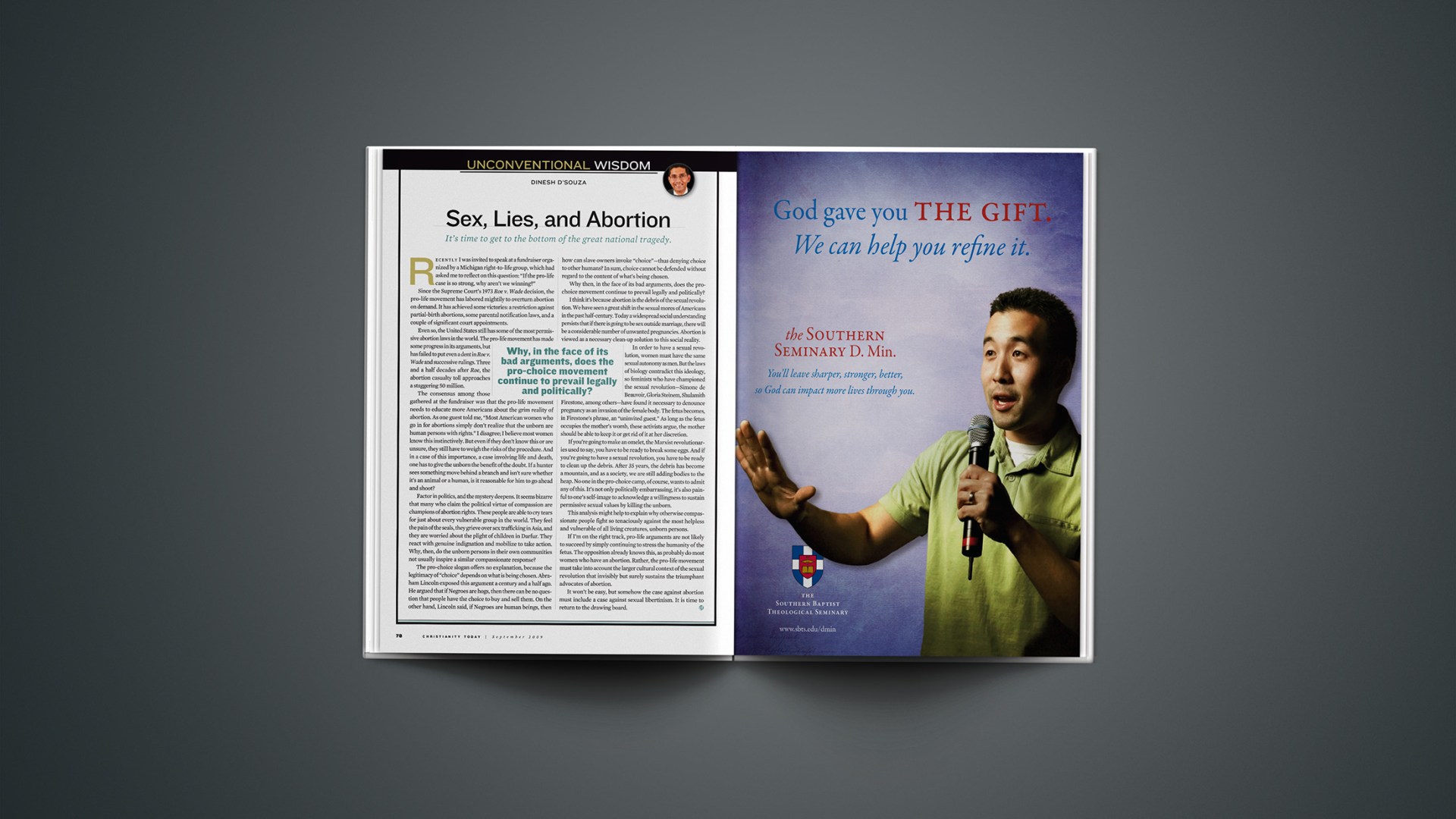Recently I was invited to speak at a fundraiser organized by a Michigan right-to-life group, which had asked me to reflect on this question: “If the pro-life case is so strong, why aren’t we winning?”
Since the Supreme Court’s 1973 Roe v. Wade decision, the pro-life movement has labored mightily to overturn abortion on demand. It has achieved some victories: a restriction against partial-birth abortions, some parental notification laws, and a couple of significant court appointments.
Even so, the United States still has some of the most permissive abortion laws in the world. The pro-life movement has made some progress in its arguments, but has failed to put even a dent in Roe v. Wade and successive rulings. Three and a half decades after Roe, the abortion casualty toll approaches a staggering 50 million.
The consensus among those gathered at the fundraiser was that the pro-life movement needs to educate more Americans about the grim reality of abortion. As one guest told me, “Most American women who go in for abortions simply don’t realize that the unborn are human persons with rights.” I disagree; I believe most women know this instinctively. But even if they don’t know this or are unsure, they still have to weigh the risks of the procedure. And in a case of this importance, a case involving life and death, one has to give the unborn the benefit of the doubt. If a hunter sees something move behind a branch and isn’t sure whether it’s an animal or a human, is it reasonable for him to go ahead and shoot?
Factor in politics, and the mystery deepens. It seems bizarre that many who claim the political virtue of compassion are champions of abortion rights. These people are able to cry tears for just about every vulnerable group in the world. They feel the pain of the seals, they grieve over sex trafficking in Asia, and they are worried about the plight of children in Darfur. They react with genuine indignation and mobilize to take action. Why, then, do the unborn persons in their own communities not usually inspire a similar compassionate response?
The pro-choice slogan offers no explanation, because the legitimacy of “choice” depends on what is being chosen. Abraham Lincoln exposed this argument a century and a half ago. He argued that if Negroes are hogs, then there can be no question that people have the choice to buy and sell them. On the other hand, Lincoln said, if Negroes are human beings, then how can slave owners invoke “choice”—thus denying choice to other humans? In sum, choice cannot be defended without regard to the content of what’s being chosen.
Why then, in the face of its bad arguments, does the pro-choice movement continue to prevail legally and politically?
I think it’s because abortion is the debris of the sexual revolution. We have seen a great shift in the sexual mores of Americans in the past half-century. Today a widespread social understanding persists that if there is going to be sex outside marriage, there will be a considerable number of unwanted pregnancies. Abortion is viewed as a necessary clean-up solution to this social reality.
In order to have a sexual revolution, women must have the same sexual autonomy as men. But the laws of biology contradict this ideology, so feminists who have championed the sexual revolution—Simone de Beauvoir, Gloria Steinem, Shulamith Firestone, among others—have found it necessary to denounce pregnancy as an invasion of the female body. The fetus becomes, in Firestone’s phrase, an “uninvited guest.” As long as the fetus occupies the mother’s womb, these activists argue, the mother should be able to keep it or get rid of it at her discretion.
If you’re going to make an omelet, the Marxist revolutionaries used to say, you have to be ready to break some eggs. And if you’re going to have a sexual revolution, you have to be ready to clean up the debris. After 35 years, the debris has become a mountain, and as a society, we are still adding bodies to the heap. No one in the pro-choice camp, of course, wants to admit any of this. It’s not only politically embarrassing, it’s also painful to one’s self-image to acknowledge a willingness to sustain permissive sexual values by killing the unborn.
This analysis might help to explain why otherwise compassionate people fight so tenaciously against the most helpless and vulnerable of all living creatures, unborn persons.
If I’m on the right track, pro-life arguments are not likely to succeed by simply continuing to stress the humanity of the fetus. The opposition already knows this, as probably do most women who have an abortion. Rather, the pro-life movement must take into account the larger cultural context of the sexual revolution that invisibly but surely sustains the triumphant advocates of abortion.
It won’t be easy, but somehow the case against abortion must include a case against sexual libertinism. It is time to return to the drawing board.
Copyright © 2009 Christianity Today. Click for reprint information.
Related Elsewhere:
Previous columns by Dinesh D’Souza include:
The Clash of Stereotypes | A recent survey reveals what Muslims detest most about the West. (July 20, 2009)
Why We Need Earthquakes | Without them, the planet couldn’t support creatures like us. (April 28, 2009)
The Evolution of Darwin | The scientist’s problem with God did not spring from his theory. (January 22, 2009)
Staring into the Abyss | Why Peter Singer makes the New Atheists nervous. (March 17, 2009)
More articles on sexuality and life ethics are available in our full coverage areas.










